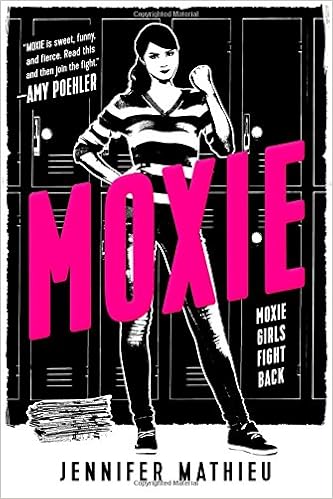4.5/5
Jennifer Mathieu's Moxie takes a hard look at the realities of being a woman that girls encounter as early as high school. I devoured this novel in one day, and I am going to jump straight in and declare the reasons for my high rating, in no particular order.
Judging the title of the book, I assumed that our protagonist Vivian would be sassy and confident, maybe even rambunctious. I thought this novel would be about a loud and proud girl who would march through the halls of her school, rallying up the female population and threatening to fight anyone who stands in her way. Vivian could not be farther from that. She's the type of person who doesn't like attention or starting conflict. This is the first point of pleasant surprise: our protagonist is not who I assumed she'd be, and I was curious as to how Mathieu was going to pull this riot off with Vivian in the lead. This brings me to the next thing Mathieu does well, which is her delicate crafting of Vivian's character in these tricky situations. Vivian is hesitant and full of self-doubt. She's vulnerable and scared, and who wouldn't be? One of the worst fates that can befall a high-schooler is ostracization, which keeps everyone from declaring his or her true perspective. Mathieu executes Vivian's fear and internal conflict deftly and naturally, and makes Vivian far more real and relatable than the bold and brash heroine I was expecting.
I also appreciated the diversity included in Moxie. Mathieu acknowledges many issues aside from sexism and assault, such as race, tradition, pride, sexual orientation, and family, without ever feeling forced or overdone. Her characters are multi-dimensional; a good example is Vivian's relationship with Seth and how she views him against her progressive efforts. Also, pay particular attention to my favorites Claudia and Emma. Their plot lines really enforce the heart of Moxie, which is that this movement is for all girls. It doesn't matter whether you call yourself a feminist or not, whether you're the head cheerleader or social nobody; all girls means all girls. Mathieu portrays Vivian's encounters with all of these different people and new circumstances (such as Vivian trying to explain to Seth, who is a "not-a-dick," why she cares so much about this movement, and Vivian's shift in perspective of a girl she thought she had pinned down) with a subtlety and grace that I am just now realizing the extent of as I think back on the novel and type this.
The third main factor contributing to my admiration of Mathieu's work is the coherency of Moxie. Undercurrents of the same themes run through all of the storylines, but Mathieu executes this with a delicacy that avoids repetition and instead allows you to see what it means to truly take a stance and how your viewpoints can affect various aspects of your life, from family to love to friends. Mathieu captures the difficult part of standing for something: it's easy to claim your beliefs, but it's hard to actually apply them. In Moxie, we get to see Vivian discover what she believes in, grow into her beliefs, and learn how they fit into the different relationships and areas of her life.
To sum up, Moxie's message is impactful and important, and its delivery is well-crafted and honest. Mathieu expresses the diversity of her characters, the vulnerability of our protagonist, and the significance of Moxie's purpose in natural and seemingly effortless narration. I would compare Moxie to a more political The Lonely Hearts Club by Elizabeth Eulberg, an all-time favorite of mine that I also highly recommend. I recommend Moxie to feminists everywhere (male or female, of course), those who like a relatively light but also meaningful read, and fans of YA realistic fiction and of good writing.



